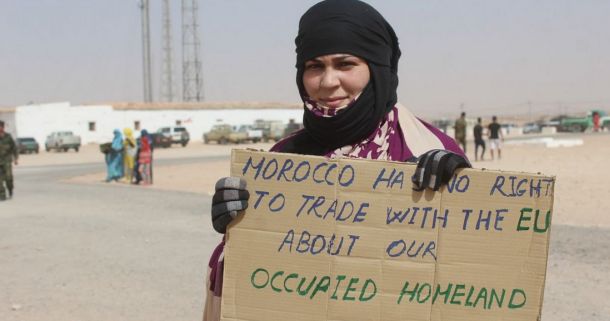
As the European Parliament prepares to vote on the extension of the EU-Morocco trade deal into occupied Western Sahara, WSRW calls on newly appointed Rapporteur Marietje Schaake to save her and the Parliament s reputation by suspending the procedure and starting over from scratch.
In two weeks, the European Parliament will vote on the proposed amendment of Protocols 1 and 4 to the EU-Morocco Association Agreement, extending trade preferences into the part of Western Sahara that is under Morocco's military control.
The report of the Parliament's International Trade Committee (INTA) that serves as a basis for the vote contains highly misleading and false claims. Find that report, with Western Sahara Resource Watch's remarks included, here.
The report, which calls on Parliament to support the proposed trade extension, was drafted by French liberal Patricia Lalonde, Parliament's appointed Rapporteur on the file until she resigned in early December 2018, following revelations about her membership on the Board of a pro-Morocco lobby group. Replacing her is Dutch liberal Marietje Schaake, who has so far not made any public comments on the proposal or on the report drafted by her predecessor MEP Lalonde.
"It is incredible that a report drafted by an MEP with a pro-Morocco agenda is still being used for Parliament's voting procedure. There is every reason to doubt the veracity of the claims made in the report, which contains misleading and factually incorrect elements. As such, we call on newly appointed Rapporteur Marietje Schaake to suspend the procedure so that she can make her own assessment of the proposal and draw her own conclusions as to whether Parliament should or should not endorse it", says Sara Eyckmans from Western Sahara Resource Watch.
Among other things, the report claims that Parliament went to "assess the situation at first hand and gain an understanding of the different views of the people".
In reality, three delegates of the Trade Committee (not Parliament as a whole), from political groups representing only 20% of the Parliament's composition, traveled to Western Sahara but were not allowed to properly assess the situation on the ground. It only went to the occupied part of Western Sahara and did not visit the third of the territory under Polisario control and the refugee camps where close to half of the Saharawi people live. Nearly 80% of the INTA visit programme was spent on meeting Moroccan interlocutors or with actors that have a direct (economic or political) interest in having the proposed Protocol approved. The conclusions of the “fact-finding INTA mission” were under the exclusive responsibility of the former Rapporteur Lalonde. Participating MEP Hautala distanced herself from these conclusions.
MEP Lalonde subsequently resigned from her rapporteurship after serious allegations of conflict of interest. This would warrant the deletion of any reference to the INTA fact-finding mission in this report.
The report is also misleading in stating that the lack of information on the origin of products exported by Morocco prevents the EU customs authorities from complying with the CJEU ruling. The Commission has an obligation to ensure compliance and to take immediate and effective action in case of doubt. On the other hand, Morocco has a legal obligation to ensure that goods with a certificate of origin of Morocco effectively originate in Morocco as internationally defined (ie excluding Western Sahara).
The explicit inclusion of Western Sahara in the EU-Morocco trade arrangement came on the back of a ruling by the Court of Justice of the European Union of December 2016, concluding that no EU-Morocco Trade or Association Agreement could be applied to Western Sahara, since Morocco has no sovereignty over or any international mandate to administer the territory. The only lawful way for such an agreement to affect Western Sahara, the Court ruled, is with the consent of the people of the territory. The Court clarified that any potential benefits of the deal to the territory are irrelevant - what matters is that the people have consented or not.
In response to the ruling, the EU Commission negotiated and initiated an amendment to the deal with Morocco - not with the people of Western Sahara, who have not had any say in the entire process. Instead of seeking their consent, the EU Commission undertook a consultation process of 18 Moroccan economic operators and government representatives - while dishonestly claiming that 94 Saharawi groups, international NGOs (like ours) and the Polisario had taken part. In spite of the shaky legal basis of the proposal - but more concerned over appeasing anti-migration and anti-terror partner Morocco - the EU Member States have endorsed the proposal.
Morocco allocates land in occupied Western Sahara to green hydrogen investors
Morocco’s ambitions to become a global green hydrogen powerhouse are accelerating. Yet, Rabat is allocating land in a territory it does not legally own.
US eyes minerals in occupied Western Sahara
Seeking to position itself as a key supplier of strategic minerals for Western powers, Morocco has signed a new agreement with the United States that covers Western Sahara’s waters and the critical minerals harboured there.
TAQA-Moeve obtains land in occupied Western Sahara
Morocco’s push for green hydrogen has taken a decisive step forward - on territory it does not legally own.
EU-Morocco Statement: autonomy without self-determination, law without lawfulness
A joint statement that came out of last week’s EU-Morocco Association Council asks readers to believe in a fiction: that an undefined autonomy plan imposed by an occupying power can satisfy the right to self-determination, and that respect for international law can coexist with the systematic ignoring of the EU’s own highest court.



